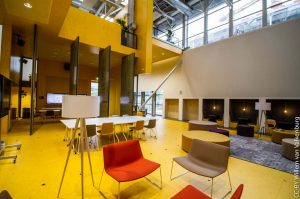Research universities have put the primary focus on the quality of research already for decades. Scientific staff is encouraged to research and publish. Appraisal cycles and career advancement rest on research achievements, with teaching achievement playing only a marginal role, as Ruth Graham shows in her study “Does teaching advance your academic career?“. It’s no surprise many scientific staff have difficulty in finding a balance between their research and the demanding activities of teaching, upgrading of courses and didactic upskilling.
When universities decide to give so much more value to research than education, why then don’t they use more full-time lecturers, for instance for the production of courses in the first years of study that have to be delivered to large numbers of students and require intensive teaching and tutoring, or for the innovation of education as well? They could make intensive classes sustainable, take education to a higher level and bring a great relief to the researchers.
It is short-sighted that many universities have a steadfast belief in the mutually beneficial relationship between teaching and research activities of their academics and keep on recruiting scientific staff for combined research and teaching functions only. Also TU Delft’s new Vision on Education document states “We believe that in a flourishing academic community, research and education go hand in hand”. It cannot be more than a belief indeed, because I have seen many quantitative studies from all over the world that show zero, or negative correlation between student learning and the research – teaching nexus.
My Faculty has 5% or so teaching-only staff. A recent survey under academic staff in this Faculty shows that this small group of teaching-only staff has low job satisfaction. An article in the Dutch magazine THEMA for higher education management with the catchy title “From disposable lecturer to innovative power” caught my eye.
Low job satisfaction
A survey under employees in 2015 showed that the group of teaching-only staff has the lowest job satisfaction, in spite of the fact that these people are highly motivated, passionate about teaching and working hard. Discussions I had with colleagues in this group after the survey results had been published, taught me that they have the perception they don’t get the credits, are not respected for their work, often feel as third-rate employee, do not feel part of the community (TU Delft statistics for instance do not include fulltime lecturers as scientific staff), get temporary contracts only, have little chances for promotion and professionalisation, and lack any career path. Some of them characterised their position as a “commodity”. And it’s all true. The November 2017 issue of the HR Plan of my faculty shows talent development schemes for our assistant- and associate professors, career paths for tenure trackers (aspirant assistant professors), but not a single word about development or promotion schemes for full-time lecturers.
This is not a one-off situation. The article in the Dutch magazine for higher education THEMA (2017 vol.2, p. 62-66), written by staff from VU University Amsterdam, addresses the same issue and uses the provocative term “disposal lecturers”. A recent (11 August 2017) blog by ScienceGuide (in Dutch) expresses the concern about the absence of career routes for professionals in higher education in the Netherlands. Report “More luck than wisdom” (in Dutch) by Goudsteen & Company of June 2015 discusses the unsatisfactory level of professionalisation of teaching staff at 14 universities in the Netherlands on the basis of interview outcomes with top-level teachers.
Adding value by excellent fulltime teachers
 My Faculty recruits teaching-only personnel on a temporary basis, for three or four years at most, and only when all other options are exhausted. It can lead to situations where an excellent fulltime lecturer, who played a successful role over three or four years in a high-risk course in the first year of studies, is discontinued and replaced by a young assistant professor, who has hardly any experience in teaching large classes or has not yet completed the basic training in University Teaching Qualification. Whose first priority is achieving excellent research results, writing papers and generating funds to assure contract renewal, because he or she is still in the process of obtaining tenure. Are we then taking education, or more specifically study success, serious enough?
My Faculty recruits teaching-only personnel on a temporary basis, for three or four years at most, and only when all other options are exhausted. It can lead to situations where an excellent fulltime lecturer, who played a successful role over three or four years in a high-risk course in the first year of studies, is discontinued and replaced by a young assistant professor, who has hardly any experience in teaching large classes or has not yet completed the basic training in University Teaching Qualification. Whose first priority is achieving excellent research results, writing papers and generating funds to assure contract renewal, because he or she is still in the process of obtaining tenure. Are we then taking education, or more specifically study success, serious enough?
If we are serious about study success and aim for continuous education innovation, there must be ample opportunities for teaching-only staff, who are highly skilled in pedagogy and didactics and able to inspire and coach students and support the scientific staff in lecturing, and who can take the lead in educational innovation projects.
“Study success, student inspiration and motivation in the first year of studies is why excellent teaching matters!”
But, the Delft survey as well as the VU University Amsterdam article demonstrate that increasing the capacity with full-time lecturers alone is not enough. Professionalisation and career routes for these professionals must be in place as well to make it a success.
Professionalisation of teaching staff
VU Amsterdam developed a suite of professionalisation activities for teaching-only staff, structured in three course pathways:
- academic practice
- pedagogy and didactics
- personal and professional development.
Most learning takes place on the job, in practical situations of challenging projects that require the trainees to step outside their comfort zone, and always work in close collaboration with the scientific staff. With workshops, masterclasses, peer-learning (between fulltime lecturers mutually, and with senior professors in the departments), and a personal coach who knows what fulltime teachers are aiming for and understands what problems they may encounter during training and practicing.
I don’t know the details of the Amsterdam professionalisation suite. I hope that also educational research is part of it: only data-driven innovations can teach us how to improve in education. For technical universities I would also be in favour to add “engineering practice” to the pathway of “academic practice”, and transform “pedagogy and didactics” into “pedagogy and didactics in an engineering context”. Teaching engineering and technology is not necessarily the same as teaching social sciences or humanities.
The professionalisation route gives these lecturers the perspective to obtain tenure in a role of fulltime lecturer or education innovator. In case they leave the university, they are well prepared for a career in lecturing at universities of applied sciences or in schools for secondary education, as a trainer for continuous professional education in companies, or as an educational policy maker.
Integrating these figureheads
I see these professionals as the future figureheads for our education who lead by example!
It could be interesting to place 20 or so, high potentials of these teaching-only staff in a university-wide pool and put them on secondment to different faculties and departments during their career. Thus they develop in all-round educational professionals while teaching and supporting the scientific staff in the development of new or reconstruction of existing courses or programmes in various engineering domains. In the secondment positions they learn how teaching and tutoring practices differ over a university, familiarise with the different engineering languages, and acquire the latest advancements in engineering and technology. By crossing the boundaries of the disciplinary faculties and departments they help pave the way to more multi- and interdisciplinary learning, which is gaining prominence in many engineering universities.
“An important success factor will be that the educational professionals speak and understand the language of the engineer”.
Such pool of “Principal Educators” (in the academic medical centres in Amsterdam and Groningen this function already has existed since three or four years as the equivalent for Principal Investigator in research), not only provides a buffer of highly qualified teaching capacity, but mainly give an innovative impulse to education. The pool may also create a sense of belonging for all teaching-only staff. At TU Delft the new Teaching Lab would be their obvious physical home.

Impression of the Teaching Lab of TU Delft (source: Willem van Valkenburg, TU Delft)
Undoubtedly the scientific staff of disciplinary experts and researchers will have to get used to the role and added value of teaching-only staff, the Principal Educators in particular. Although many scientists find it hard to juggle their research with the pressures of teaching, they still feel overly optimistic about their available time and skills, and express their superiority for research in the same sentence as for education.
The VU Amsterdam established a group of young fulltime lecturers in their Faculty of Earth and Life Sciences. They are positive about the first experiences. The fulltime teachers are respected by the scientific staff and play important roles in improving and innovating education, with activities such as curriculum analysis, development of skills and study guidance, e-learning materials, masterclasses for pre-university college, and developing transparency of career perspectives.
Epilogue
Many universities put very high pressure on their scientific staff to excel in research, generate funds, teach, and more. For sure, educational innovation is not a priority. In the first years of engineering studies, excellent teaching matters much more than the nexus between research and teaching.
A pool of highly-qualified fulltime lecturers with tenure, Principal Educators, who are all-rounders and prepared for different career routes in higher education, could be a welcome and highly-skilled resource for supporting educational activities of scientific staff, and leading data-driven innovations in engineering education.
If we are serious about weighing teaching excellence and leadership in education on par with research excellence and leadership in research, let’s move on from just discussing it, and change the system many of us dislike but we have made ourselves.
“Dare to be yourself”
(quote Andre Gide, Nobel Prize winner in Literature 1947)




2 Responses to How to transform disposable fulltime lecturers into innovative power?